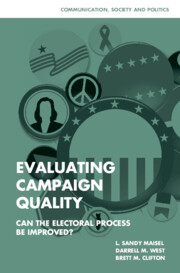2 - Dissemination of Campaign Practices
Published online by Cambridge University Press: 03 December 2009
Summary
Reformers can propose wonderful ideas about improving electoral campaigns, but if these suggestions are not disseminated, visible to voters and campaign participants, and if they do not have a discernible impact on campaign discourse and conduct, they are not very effective. Candidates and political consultants must be made aware of campaign reforms because they are the ones who make decisions on going negative and the degree of substantive appeals to incorporate into campaign communications.
At a point when campaigns have become professional, organized entities with multimillion dollar budgets, the views and behavior of consultants are crucial. Their opinions matter because their impressions of the political climate, media reaction, and possible backlash against particular tactics influence their behavior. If they believe that reporters and citizens will punish unfair tactics, vague discourse, or harsh attacks on the opposition, they will be far less likely to employ these strategies than if they perceive few risks to those kinds of behaviors.
At the same time, voters represent an important audience for political reforms. Citizens are the ones who remain deeply cynical about contemporary campaigns. After witnessing unsatisfactory government performance and shrill campaigns featuring misleading or unfair communications, average citizens see politicians as failing to serve societal interests or the common good. Rather, these candidates are seen as advancing their own parochial interests.
- Type
- Chapter
- Information
- Evaluating Campaign QualityCan the Electoral Process be Improved?, pp. 15 - 31Publisher: Cambridge University PressPrint publication year: 2007

